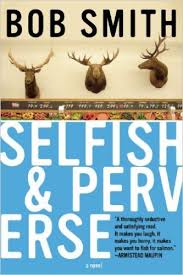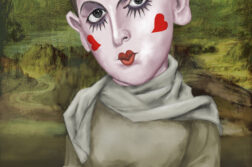 Selfish & Perverse
Selfish & Perverse
by Bob Smith
Carroll & Graf. 376 pages, $26.
STAND-UP COMEDIANS, because their success usually relies on being able to think in short, epigrammatic bursts, rarely venture into the realm of more extended prose writing. In doing so, Bob Smith has followed the example of comics such as Stephen Fry and Steve Martin by writing a full-length—indeed quite hefty—novel, and a hilarious and smartly crafted one at that. Smith is a founding member of the popular comedy troupe Funny Gay Males and the first openly gay comedian to appear on The Tonight Show. His debut novel, Selfish & Perverse, is a wild and engaging romp with a cast of queer characters who often verge on being cartoonish but somehow feel believable throughout the tale.
Smith’s novel begins in Los Angeles, where his quirky yet likeable narrator, Nelson Kunker, himself an aspiring novelist, lightly bitches and flirts his way through his days as a script coordinator for a late-night TV comedy show called Aftertaste, accompanied by his best friend and sparring partner, a raunchy lesbian named Wendy. Frustrated by his apparently dead-end job, Nelson reveals early on: “What had me worried was that I was an artsy, 34-year-old man who needed to confront whether I was really talented or just gay.” At work Nelson meets the two men who’ll vie for his attention for the remainder of the book: Roy Briggs, an Alaskan fisherman who’s a relative of one of Nelson’s colleagues; and Dylan Fabizak, a major Hollywood sex symbol (think Brad Pitt) who’s slated to appear on Aftertaste in the wake of a prison stay for drug possession. Nelson and the ruggedly hunky Roy quickly become boyfriends, while the closeted Dylan attempts to intercept Nelson’s affections. “My soul appeared to be a bit of a slut,” thinks Nelson, “hooking up with a frequency that would make a call girl blush.”
After he gets fired for smoking pot on the job, Nelson decides to spend the summer with Roy, writing a novel in the wilderness outside of Anchorage; likewise for Dylan, who plans to study with Roy for an upcoming film role as an Alaskan fisherman, as fate would have it. Once the trio arrives at the tiny, idyllic encampment called Coffee Point, the novel suddenly goes from wacky hybrid of recent TV comedies like The Office and Studio 60 on the Sunset Strip, to something closer to the critically acclaimed, Alaska-set 1990’s hit Northern Exposure. Paradoxically, the pace of the narrative speeds up in this austere, bucolic landscape, allowing the character studies to become more detailed as the romantic and sexual high jinks ensue. Among the novel’s many admirable qualities, in fact, is the steadiness with which Smith sustains the sexual tension between Nelson, Roy, and Dylan throughout the first three-quarters of the book.
Nelson’s observations also become sharper and more nuanced as the novel progresses, as when he realizes during his talks with part-time archaeology student Roy that “one of the reasons I required a boyfriend was to halve my ignorance and double my chances of understanding the world and myself.” What might have been a standard fish-out-of-water story gradually gives way to Nelson’s midlife awakening, expressed in precise, poetic metaphors: “Sometimes I imagined my innocence falling from the top of an hourglass, filling the lower half with maturity.” There’s plenty of room for Smith to demonstrate how well-read and knowledgeable he is himself, and references to everything from obscure literary works to Alaskan geology to little-known historical trivia pop up regularly. The narrator’s use of those factual details feels slightly forced sometimes, just as his comic one-liners can occasionally border on being corny, but in Smith’s hands even these prove to be endearing character traits. Who else could close a hysterical early chapter in which Nelson literally gets stuck in the La Brea Tar Pits (and becomes an instant media sensation) with a genuinely romantic dénouement? The rest of the novel follows suit and offers generous helpings of insight, humor, and heart.
____________________________________________________________________
Jason Roush, author of After Hours and Breezeway, teaches at Emerson College.




